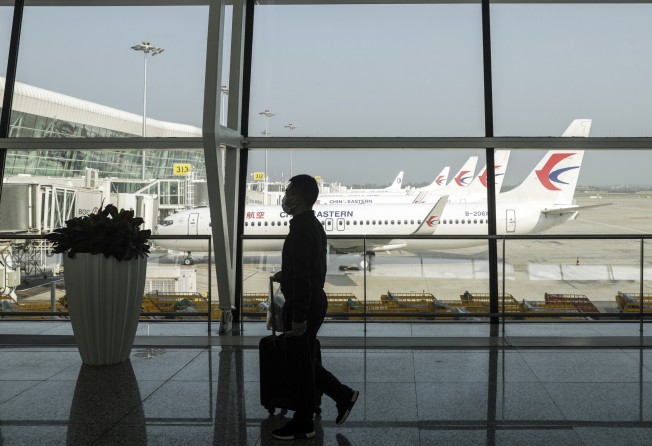Cut subsidies to inefficient Chinese airlines: European business group
- Authorities should ensure that air traffic to new cities is guided by the market and does not lead to oversupply, chamber says
- ‘Only international long-haul routes to and from either Beijing or Shanghai are profitable’

A leading European business group has called on China to bring its aviation industry more in line with international standards as it grows to become one of the biggest in the world.
The call from the European Union Chamber of Commerce in China comes as Beijing struggles to shore up its economy, which has been hit hard by the Covid-19 pandemic and acrimony with the United States over a wide range of issues from trade to technology, security and Hong Kong.
In the report released on Tuesday, the chamber urged Beijing to phase out government subsidies for long-haul air routes to and from second- and third-tier Chinese cities.
Authorities should ensure that expansion in air traffic to new cities in China is in line with market conditions to avoid an oversupply of passenger flights, according to the report “In for the Long Haul: Developing a Sustainable Operating Environment for Airlines in China”.
Chamber president Joerg Wuttke said the lack of competition in Chinese aviation was similar to that in Europe before market liberalisation in 1993.
“We are coming from a region which had in itself an inefficient airline business until 1993 and we saw it’s valid to maybe share the experience we had over the last nearly 30 years with China to make sure that China also benefits from a more efficient aviation market,” Wuttke said.
Foreign business communities have long complained about the slow pace of reform and lack of progress on creating a level playing field in China. Beijing is also taking on a combative approach to counter international criticism of its handling of the Covid-19 pandemic, and most recently, its decision to draft a national security law for Hong Kong.
Wuttke warned that China was becoming “international retracting” and “less willing to accommodate to actually try to listen to other countries” which would undermine possible cooperation with major partners.
The aviation industry has been battered by the pandemic, which has grounded most passenger flights.
Without travellers, some of those passenger aircraft have been converted into cargo planes.
China’s finance ministry said last week that it would subsidise Chinese and foreign airlines to operate cargo flights to and from the country to support the cargo industry and stabilise the global supply chain.
The chamber’s report acknowledged the government support to help the sector weather the difficulties, but focused on long-term challenges on foreign airliners in China.
“It’s clear that there are massive distortions in air traffic between Europe and China that go against the market dynamics in Europe,” Wuttke said before the report’s release.
In China, only international long-haul routes to and from either Beijing or Shanghai were profitable, the report said, calling for more flights to the two cities.
Despite progress made in recent years, China has still not fully adhered to international standards in slot allocation and air traffic management, and in contrast to the EU and the United States, most of its airspace is closed as 70 per cent is under military control, according to the report.
Rather than focusing on sustainable growth and profitability, Chinese carriers had pursued short-term strategies to quickly gain global market share with the support of government subsidies, the report said.
It also said many local governments of smaller cities offered airlines financial support to open international routes, but such policies failed to make the routes sufficiently profitable and led to an oversupply of passenger flights to European destinations.
“If this situation continues in the long term, European airlines will not be able to sustain their current level of market share, let alone increase it, and there is a real risk that the European aviation industry will become marginalised on a global level,” the report said.
“In order to create a sustainable, open and competitive operating environment for both domestic and international airlines, more reforms are needed, especially in the areas of government financial support and competition.”
Wuttke also called for unified coronavirus testing and quarantine procedures in China, saying they varied from city to city.
“It’s very important for China to sort out the kind of local and regional solutions and come up with national solutions,” he said.
The report also suggested that China adhere to international guidelines to increase the frequency of landings and departures.
“Although the EU and China are working towards better alignment of their respective airline sectors, we are not there yet,” said Philippe Bardol, chairman of the chamber’s aviation and aerospace working group.
“EU-China dialogue on aviation must therefore continue, in the interests of creating a sustainable and competitive environment for airlines worldwide.”